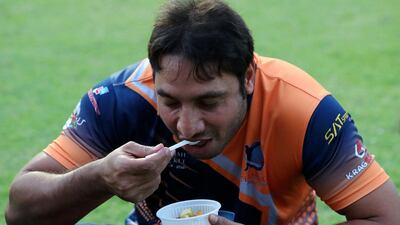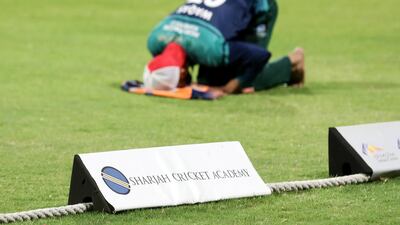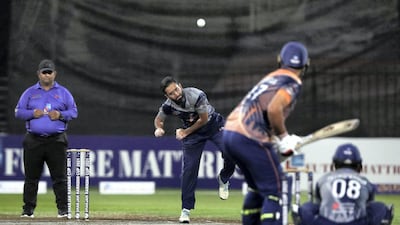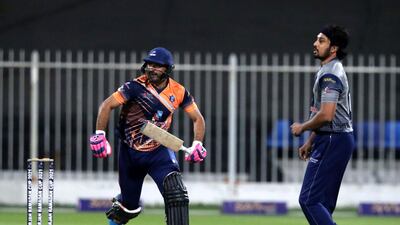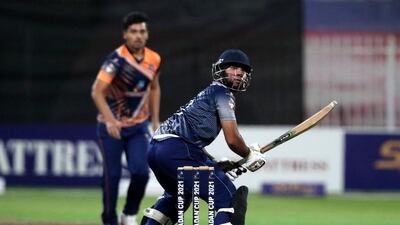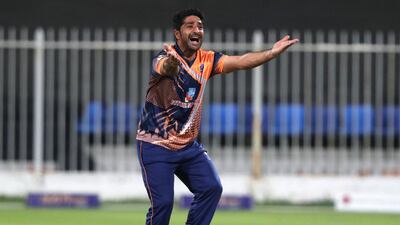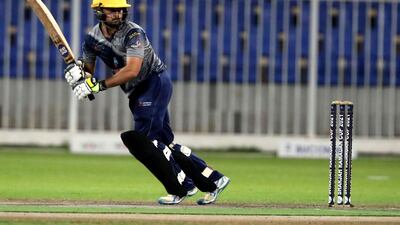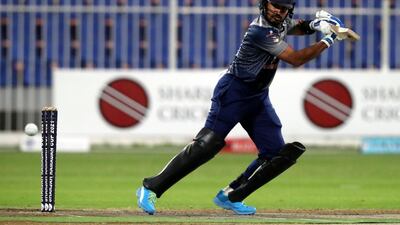As match preparations go, these are far more chilled than the norm.
There are no frenetic fielding drills. No bowling at a set of stumps, to a helper with a catching mitt returning the ball.
The din of balls being crashed into walls by batsmen getting their eye in with throw-downs is conspicuously absent.
Instead, players sit together on chairs or on the outfield, and chat and laugh.
Then, when the clock ticks over to 6.47pm, they settle down on the grass together, eat from boxes that have been laid out for iftar, and drink water and fruit juice.
After breaking their fasts, they undertake maghrib prayers. Then, just as the last of the players roll up their prayer mats, the umpires head out to the middle before calling “play”.
This 7.15pm fixture between two of the country’s leading teams – MGM Cricket Club and Pacific Group – is the only match at Sharjah Cricket Stadium this evening, but that is rare. Ramadan is a busy time for cricket.
The 32nd Sharjah Ramadan Cup generally has two matches per night, the first starting just after iftar, and the second at 10.30pm.
The late games finish about 2am, by which time the players' thoughts might already be turning towards suhoor, the pre-dawn meal eaten just before sunrise.
If players do not have a fixture here, then they will likely have one somewhere else, in Ajman, or Batayeh, or Al Dhaid.
According to Nabil Afridi, a player and administrator for MGM Cricket Club, the holy month was packed with cricket.
“Ramadan is the most eagerly awaited season, where every player wants to play,” Afridi says.
“There is so much cricket during Ramadan. Everywhere you look, there are two matches happening [per night] at every ground.
“One match will start straight after iftar. It is not challenging for the players at all, to be honest.
“They love reaching the ground before the fast ends, and break their fast together. It is a unique experience. Everybody is waiting for it.
“Tournament organisers put on a lot more tournaments during Ramadan because they know they will get a lot more teams wanting to play. Everybody loves to play at this time of year.”
Conventional wisdom suggests that fasting during the day could have a detrimental effect on a sportsman's performance.
However, international players such as Hashim Amla and Moeen Ali have often reported improved results during Ramadan.
“If you notice when Pakistan were playing against South Africa, and now against Zimbabwe, how well [Mohammed] Rizwan did,” Afridi says.
“He has been fasting while playing. It is a spiritual thing that hits you from inside, and gives you motivation to take your game to another level.
“It helps us, even for amateur cricketers.”
So it proves in this fixture, too. Mohammed Wasim, the batsman who has been taking domestic cricket by storm in recent times, goes out to bat first after iftar – and he clicks straight into the usual routine.
He blazes 69 from 41 balls for Pacific Group, and the game is as good as over before it has really begun.
His teammates revel in his success, which is another feature of cricket during Ramadan. Because the players break their fasts as a team, they say they are closer knit than ever.
“It is different, and it is not easy to start playing directly after eating your food,” says Hamdan Tahir, the Pacific Group wicketkeeper.
“But we have to manage, because it is the peak time of cricket.”
At 17, Hamdan is still getting to grips with the routine of fasting during the day, then playing late-night cricket.
“After the first one or two fasting days, we have a good idea what to do,” he says.
“If the game starts at 7.15pm, we try to drink as much liquid as we can, then eat fruit.
"The food we get is after the game, so we don’t feel heavy when we are playing during the game.
“Liquid and fruits gives us all the energy we need during the game.
“We are having food every day together, sharing in that experience.
“Some days it might be me bringing the food. Other days it might be someone else. It becomes a daily routine and we are like a family now.”



